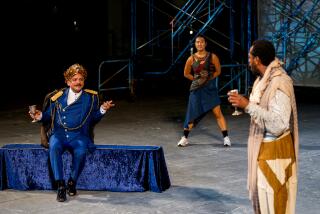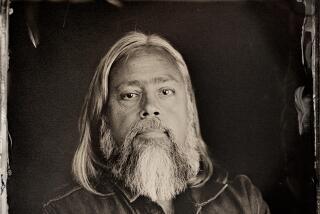‘Salvage’ at the Autry
Napoleon Bonaparte once said, “There is no such thing as accident; it is fate misnamed.”
For Wolf, the Native American owner of a salvage yard, the demarcation between fate and accident is the fine white line on a dusty highway in Diane Glancy’s world premiere, “Salvage.” Did Wolf wander over that line in a moment of fatal distraction? Did the driver of the other car? Or did they cross over that thin divider simultaneously in a moment of catastrophic convergence?
In this latest offering in the stage series Native Voices at the Autry, it’s never clear who’s to blame for the devastating car accident that jump-starts the play. Glancy is more concerned with that single defining moment, the lightning strike that obliterates all recognizable landmarks in an instant.
Who is actually at fault is of little consequence. What matters is that Harry Stover, the driver of the other vehicle, bitterly blames Wolf for the accident, which he construes as a volitional act of vengeance. When his wife dies of her injuries, Harry sets out to make Wolf pay.
The setting is a Montana reservation, but the escalating cycle of violence and retribution is as Greek as it is tribal. Passages of delicate poeticism are interspersed with scenes of striking terror. Wolf’s tenacious antagonist is never seen. Neither are Wolf’s two young sons, collateral damage in the escalating conflict. The action centers entirely around Wolf (Noah Watts), his wife, Memela (Elena Finney), and Wolf’s father, Wolfert (Robert Greygrass-Owens).
A strong-willed man and a proud provider, Wolf feels control slipping out of his grasp as the liquored-up Stover stalks his wife and children. The product of a deprived background, Memela finds her devout Christianity severely tested as her stable domestic microcosm unravels. An exponent of the old ways, the elderly Wolfert has one foot in the spirit world, communing with his departed loved ones as if they were still physically present in his life. But despite his preoccupation with cosmic matters, he’s a practical presence, backing Wolf up with a loaded rifle and ready courage.
Director Sheila Tousey elicits solid performances from her performers, particularly Greygrass-Owens, whose granite features jibe perfectly with his bedrock performance. Despite a too-shallow playing area, Susan Scharpf’s set, evocatively lighted by R. Craig Wolf , is colorfully junky. Michel Tyabji’s sound design, a rich blend of beating hearts, ticking clocks and ghostly chimes, functions like a musical score, subtly augmenting the mood. Glancy sometimes slips into didacticism, but her otherwise moving drama unfolds with a mythic inexorability that grips us right until the end.
Foley is a freelance writer.
More to Read
The biggest entertainment stories
Get our big stories about Hollywood, film, television, music, arts, culture and more right in your inbox as soon as they publish.
You may occasionally receive promotional content from the Los Angeles Times.










